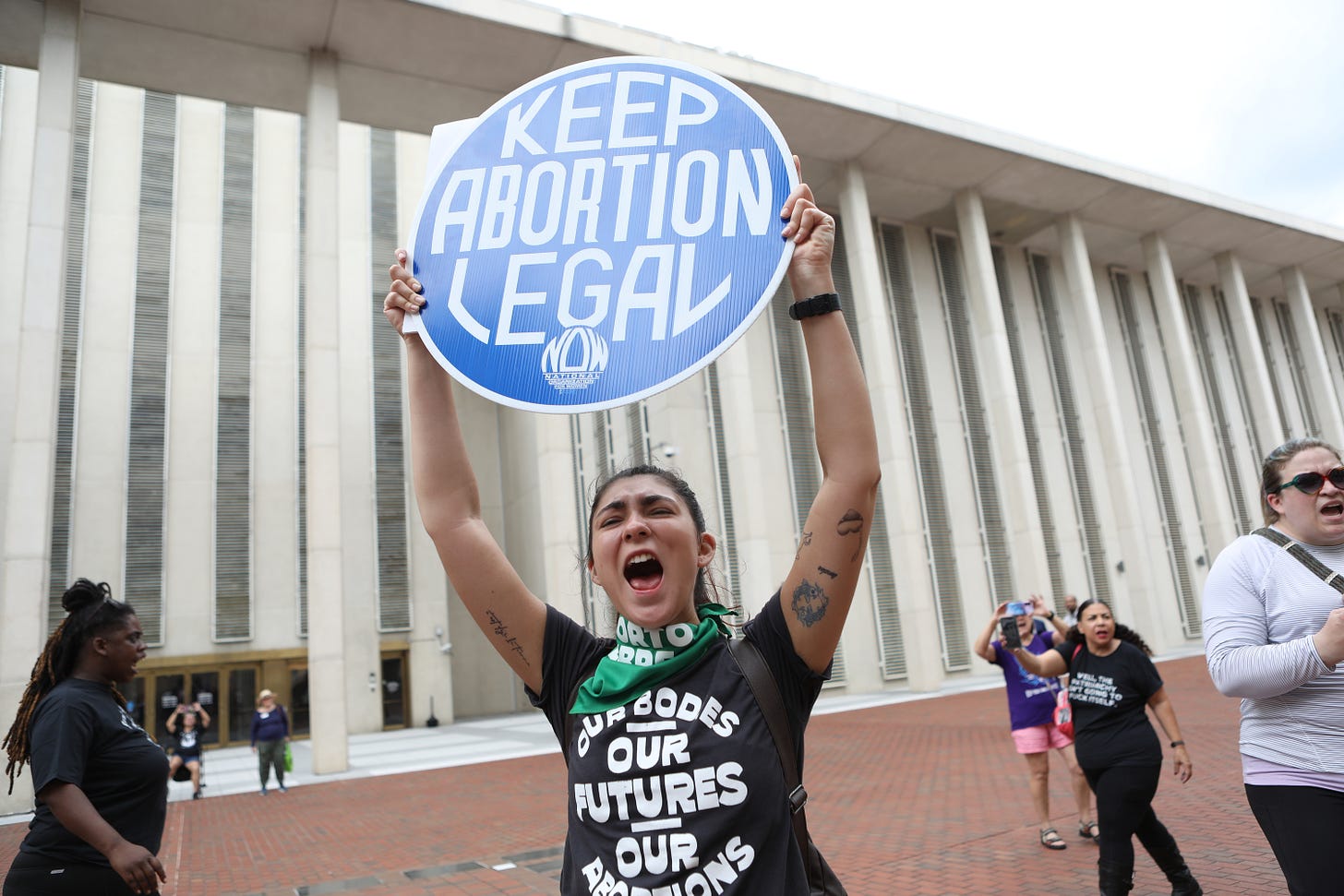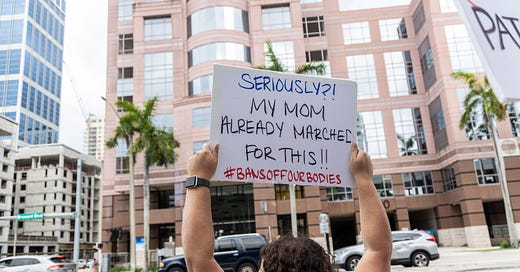Republican Politicians Keep Learning That Abortion Is Popular and They Are Not
Florida Amendment 4 gives 22 million people the chance to protect abortion access over the strident objections of Republican elected officials.
In his opinion in Dobbs v. Jackson Women’s Health Organization, the 2022 Supreme Court case that overturned Roe v. Wade and ended the constitutional right to abortion, Justice Samuel Alito repeatedly emphasized that the Court was not ruling one way or the other on the legality of abortion. Instead, he wrote, Dobbs merely returned the “the issue of abortion to the people and their elected representatives.”
In the years since, the distinction between “people” and their “representatives” has proven more material than Alito imagined. In states like Alabama, Louisiana, and Texas, long-dormant “trigger” laws banning abortion took effect immediately after Dobbs was decided. In the months that followed, lawmakers fast-tracked new anti-choice laws in Nebraska, North Carolina, and Utah, among other states. Legal challenges to many of these restrictions continue, but Republicans, unencumbered by Roe for the first time in two generations, had little trouble getting them across the legislative finish line.
When the question actually goes to the people—real people, not Republican politicians who have gerrymandered themselves into power in perpetuity—the results have been notably different, even in purple and red states. In November 2022, Michigan voters approved an amendment to create a state constitutional right to “reproductive freedom.” Voters in Ohio did the same thing the following year, functionally overruling a six-week abortion ban that the Republican-controlled legislature passed in 2019. A ballot measure to eliminate a state constitutional right to abortion care in Kentucky, where Donald Trump won 62 percent of the vote in 2020, earned just 47 percent of the vote in 2022. Voters in Kansas, which Trump carried by 15 points, rejected a similar proposal by almost 18 points.
These democratic repudiations of Dobbs and the movement behind it make clear that for all the political power that Republican judges have arrogated to themselves, their policy agenda still bears little resemblance to what normal people want. As it turns out, even without Roe on the books, the principle that the personal health decisions of millions of people should not be in the hands of a cabal of dead-eyed reactionaries still enjoys bipartisan support.
This fall, Florida voters will get their shot to weigh in on it. Earlier this week, the Florida Supreme Court decided that Amendment 4, a proposed constitutional amendment to protect abortion access to the point of “viability,” will indeed be on the ballot in November. (Viability is kind of a fuzzy concept, but is generally up to 24 weeks of gestational age.) Anti-choice activists had challenged the proposal on the grounds that some of its technical language was insufficiently clear, but the court rejected these arguments by a 4-3 vote. Barring consideration of the amendment on this basis, the per curiam opinion concludes, would “encroach on the prerogative to amend their constitution that the people have reserved for themselves.”
In a separate opinion issued the same day, the court also heldthat the current iteration of Florida’s constitution does not protect a right to abortion access. This decision clears the way for immediate enforcement of a 15-week abortion ban that Florida Republicans, unable to wait for Roe’s formal demise, passed in early 2022—and, by extension, a six-week ban that Republicans passed in 2023, emboldened by Dobbs to press a little further with the work of state-sanctioned misogyny. Since most people do not know they are pregnant at six weeks, this law functions as a total ban on abortion in the nation’s third-most populous state.
This exercise in jurisprudential whiplash sets up the election as an all-or-nothing proposition: On the morning of November 6, 22 million people in Florida will either have a new, constitutionally protected right to abortion care through 24 weeks, or basically no right to abortion care at all.

Under state law, constitutional amendments require a supermajority of 60 percent of voters to pass, a threshold that none of the aforementioned initiatives in other states managed to clear. Polling, however, suggests that doing so here is not out of the question: A November 2023 survey, for example, found that 62 percent of Florida voters, including 53 percent of Republicans, said they’d vote yes on the amendment. Of the more than 1 million people whose signatures helped put Amendment 4 on the ballot, some 150,000 are registered Republicans. The confirmation that abortion access will be on the ballot even has Democrats wondering if they can flip Florida in 2024, a proposition that feels both unlikely and also, at the very least, more likely than it did this time last week.
Of course, Amendment 4’s passage would not be the end of the anti-choice movement in Florida, where lawmakers have a nasty habit of ignoring election results that do not align with their policy preferences. In 2018, 65 percent of voters approved a different Amendment 4, which restored voting rights to people previously convicted of felonies. Republicans, fearing that the sudden enfranchisement of some 1.5 million people would imperil their political power, quickly passed a law that compelled aspiring voters to first complete “all terms” of their sentences, including payment of outstanding fines and fees—a stunt that, in effect, appended an unconstitutional poll tax to an already-approved ballot measure that included no such requirement.
Amendment 4 supporters challenged the law, but in 2020, a federal appeals court upheld it, thus ratifying state lawmakers’ bid to nullify their constituents’ clearly expressed preferences. If this fall’s version of Amendment 4 passes, I do not know what similarly harebrained scheme Jonathan Mitchell will cook up to try and evade it, but I do know it will be stupid and terrible, and that any Trump-appointed federal judge who has the opportunity will happily sign off on it.
Conservative activists worked so hard for so long to overhaul the federal judiciary for a simple reason: They understand that by controlling the least accountable branch of government, they can accomplish policy goals by judicial fiat that would otherwise remain out of reach. Whatever the eventual fate of Amendment 4, the anti-choice movement’s spotty track record since the triumph of Dobbs demonstrates both the strengths and limitations of this strategy: Yes, Dobbs gave Republicans more power to limit reproductive freedom. But the more power voters have to decide these questions themselves, the more those lawmakers are going to be reminded that their preferred answers were never popular in the first place.
As always, you can find everything we publish at ballsandstrikes.org, or follow us on Twitter at @ballsstrikes, or get in touch by emailing contact@ballsandstrikes.org. Thanks for reading.
This Week In Balls & Strikes
A Small Alabama Town Stopped Holding Elections In 1965. Black Residents Are Begging a Federal Court to Change That, Madiba Dennie
In a federal judiciary controlled by conservatives, the best liberals can hope for is a judge who thinks basic principles of democratic governance still matter.
Amy Coney Barrett, the Supreme Court’s Long-Awaited Champion For Women, Jay Willis
It’s time for liberal critics to admit they were wrong about Barrett, who has shown millions of Americans that it’s possible to disagree without being disagreeable.
Republican Justices Keep Slow-Walking Cases to Help Republican Politicians Win Elections, Madiba Dennie
An illegal racial gerrymander in South Carolina will remain in effect for the 2024 election thanks to the Supreme Court’s strategic inaction.
Why Are Law Schools Outsourcing Student Services to the Federalist Society?, Molly Coleman
Law school is getting more expensive and less useful to students. An organization of right-wing legal activists is happy to fill the void.
This Week In Other Stuff We Appreciated
Adeel Mangi Should Be the First Muslim Federal Appellate Judge—If Islamophobia Doesn’t Interfere, Judge Timothy K. Lewis, The Philadelphia Inquirer
A Republican-appointed former federal judge on the right-wing smears of Adeel Mangi.
A Texas Court Has Decided to Let the Scariest Judge In Texas Keep Being Scary, Elie Mystal, The Nation
Shocking news, “politely asking Matt Kacsmaryk to stop rubber-stamping whatever brain-dead shit the Alliance Defending Freedom puts on his desk” did not work.
What Stephen Breyer Gets Wrong About the Supreme Court’s “Civility”, Hayes Brown, MSNBC
“The sentiment of Breyer’s writing manages to combine that of a disgruntled retiree’s sepia-tinged remembrances and an overly earnest Facebook post.”
For the Sake of All of Us, Sonia Sotomayor Needs to Retire From the U.S. Supreme Court, Mehdi Hasan, The Guardian
“It is because I am so worried about the future of minority rights in this country that I – reluctantly – want Sotomayor to step aside.”





